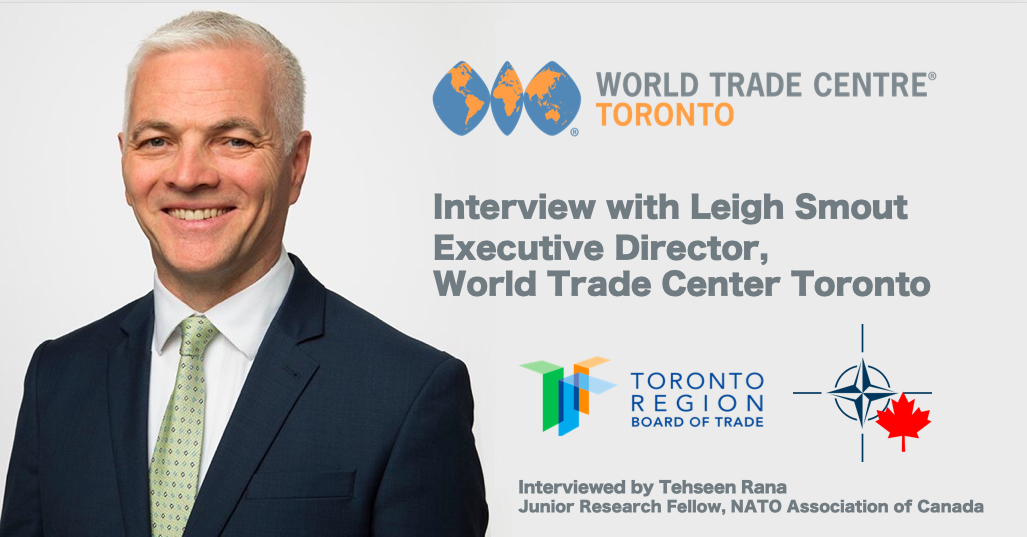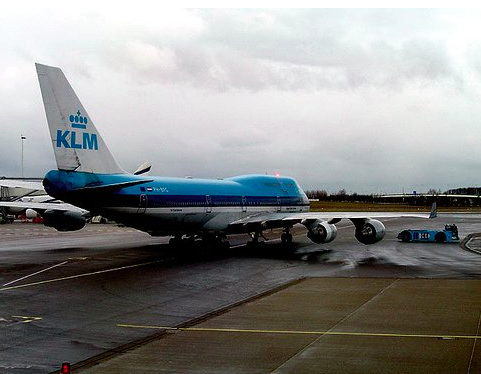In the context of business growth opportunities, there is significant untapped potential fostered by the rules based international order. This interview with Leigh Smout, Executive Director of World Trade Center Toronto, sheds light on the correlation between international trade and business competitiveness as well as the tools and programs available to help Canadian companies. This is in addition to recommendations for business owners and executives trying to manage risk exposure in an already competitive landscape affected by increased protectionism and economic uncertainty abroad.
World Trade Center Toronto (WTC-T) is the trade services arm of Toronto Region Board of Trade, one of the largest and most influential chambers of commerce in North America. As a member of the World Trade Centers Association, WTC-T creates unparalleled global access for the Toronto region’s business community with its connection to 326 branded properties and trade services associations in 89 countries.
As Executive Director of World Trade Center Toronto, Leigh Smout is responsible for planning, developing and implementing WTC-T’s business plan. He is an experienced president, CFO and COO in the public and private sectors, with an interest in opportunities to grow or transform products, services, organizations or programs. In the following interview, NATO Association Research Analyst Tehseen Rana sat down with Mr. Smout to discuss the relationship between Canadian business and international trade.
TR: Toronto Region Board of Trade mentions, “Trade is more critical than ever to the success of Canadian businesses and the country.” Can you expand on this statement and explain how it relates to organizations with and without current operations outside of Canada?
LS: This statement has a lot to do with globalization, which is a fact of life in most places. The nations that are trying to reverse the advances of globalization are only hurting their own economies. You can’t expect to operate exclusively in your local market and not have anyone compete with you. International competition affects us whether we like it or not and the best way that we can counter this is to be strong international competitors ourselves.
Canadians very often have interesting and unique products and services, which is exactly what one looks for in an internationally trading company -. It’s also very important for organizations currently trying to develop their international trade to measure their own capacity and the motivation to do it. This includes evaluating their unique value proposition and if it can be successful abroad.
WTC-T helps companies without current operations abroad understand that doing business exclusively in the local market will limit their customer access to 32 million geographically dispersed people. In many cases, we have better trade agreements with other countries then we do between provinces. Overall, not looking beyond the borders of Canada limits one’s ability to succeed.
TR: What is the most valuable service the board offers in helping firms looking to expand their operations abroad?
LS: The Trade Accelerator Program (TAP) connects business to the trade ecosystem in Canada. This includes some private sector partners such as RBC, UPS, accounting and legal firms. This gives a business access to expertise from a professional consultant’s view into your businesses. Through training and workshops they provide value from their knowledge of a very specific area of your business and how it will be affected internationally. We also work with EDC, Trade Commissioner Services, the Province’s Ministry of Economic Job Creation and Trade and the City’s economic development division.
WTC brings together 15-20 companies at a time that are interested in international trade. Through presentations from our partners and a two-day workshop, companies benefit not only from the professional advice of WTC-T’s partners but also by sharing their exceptional knowledge among themselves. This is followed by assistance in developing a trade plan and customized mentorship.
TR: Canada strongly supports free trade as a means to open foreign markets to Canadian goods and services. This has led to talk with regions around the world to ratify trade agreements outside North America. How have companies been affected by these global initiatives?
LS: I believe Canada’s view towards open trade, whether under Liberal or Conservative leadership, towards negotiating trade agreements and opening our borders, is critical. I don’t think that Canada can survive as a small country without being a strong trading nation.
Current trade agreements around the world give Canada access to about 1.5 billion potential consumers without or almost without tariffs. The challenge for companies is awareness of these agreements and their ability to unlock new business opportunities. Companies already trading such as members of the Board of Trade are glad to see reduced tarriffs, but what these agreements don’t seem to be able to do is open doors to a lot of new, non-trading companies.
I think the government has done a phenomenal job of creating free trade agreements and not a very good job of communicating the opportunities these agreements generate. In my view, the best way to communicate this to entrepreneurs is through stories because the stats just aren’t that interesting to people.
TR: With the recent rise in protectionism and economic uncertainty, what advice do you have for business owners and executives looking to successfully arm their organization for global growth?
LS: Complacency is a topic of concern. It is well known that Canadians are cautious and are relatively risk averse. A lot of opportunities exist to help them and enhancing awareness of these opportunities would incentivize greater risk taking.
For example, an entrepreneur might be concerned about doing work in India because they heard that someone else doing work in India didn’t get paid. EDC, one of our partners can mitigate that risk for you! They can actually guarantee your payments through insurance and other products. You’ll have to pay for it but you can build it into your planning as long as you are aware that it exists through having a relationship with EDC.
As someone who’s previously been self-employed, I can relate to business owners that have never given a thought to international trade. You look at your business and think, “I just don’t have time”, as you focus on day to day operations. But if you are dependent on any given market, especially your home market, you open yourself up to risk and ambiguity resulting from developments in that market that are out of your control. Entrepreneurs have to find the time and will to open their businesses to new opportunities. Another lesson learned is that when you do take the plunge internationally, it’s best to first establish yourself in one market, learn some lessons and after you’ve found success, take those lessons into the next market.
Overall, diversifying markets and using the support systems available by the public and private sectors is very important for business owners and executives looking to successfully arm their organization for global growth. It’s not rocket science it’s just diversifying your risk.
Photo: Leigh Smout (2019) via The Pacific Trade Show
Disclaimer: Any views or opinions expressed in articles are solely those of the authors and do not necessarily represent the views of the NATO Association of Canada.




